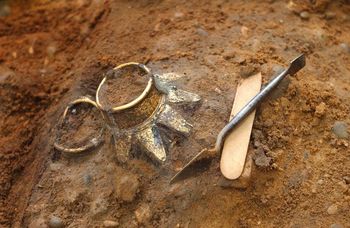ADS Terms of Use and Access
Prior to the instigation of Creative Commons licensing the ADS used a bespoke Terms of Use and Access licence for datasets.
Unless a form of Creative Commons or Open Government licence is clearly attached to a data collection and prominently displayed in that data collection’s left hand menu the following Terms of Use and Access apply:
ADS Terms of Use and Access Summary
You can:
- Use materials for research, learning and teaching purposes
- Adapt, remix, transform and build upon the material for research, learning and teaching purposes
- Share copy and redistribute the material in any medium or format
If you:
- Acknowledge in any publication the original depositors, the funders of the data collections (if different) and the ADS supplying the data materials
- If you remix, transform, or build upon the material, you must distribute your contributions in the public domain
You can’t sell material to a third party
Notes:
By teaching we mean directed teaching undertaken with a designated tutor in a formal setting.
By learning we mean self-directed study, whether or not attached to an educational institution.
By research we mean any work undertaken for the advancement of archaeological knowledge and/or the understanding of the historic environment. Such work may be commercially sponsored, funded by academic bodies or learned societies, or it may be unsupported. It therefore includes fieldwork undertaken under commercial contract, so long as any outcomes are placed in the public domain.
The following is an example of how to correctly cite an ADS data collection:
Southampton City Council (2013) Chapel, Royal South Hants Hospital, Fanshawe Street, Southampton (SOU1570) (data-set). York: Archaeology Data Service (distributor) (doi:10.5284/1018074).
The above summary is an explanatory aid and not a substitute for our terms of use and access to ADS resources which are are defined in these documents:
1. Copyright and Liability Statement
Preamble
Archaeological data are the product of many years of scholarship by numerous archaeologists, collectors, analysts, antiquarians, field workers and laboratory scientists. It is not possible to credit all these scholars individually, or sometimes even identify them, but in making their data available for re-use, the ADS acknowledges their contribution. At all times, the ADS seeks to protect the intellectual property rights and copyright of the originators of data where that can reasonably be achieved. The catalogue also includes links to other service providers. It is the responsibility of users to acknowledge and comply with the copyright conditions that may be imposed by other service providers.
Questions about copyright should be addressed to the Archaeology Data Service, King’s Manor, The University of York, York YO1 7EP, UK. See also the ADS Common Access Agreement (see below).
Copyright Statement
All material on this web server is protected by copyright. Specific copyright holders are identified in the appropriate pages and sections. In all other instances, copyright is retained by The University of York on behalf of the Archaeology Data Service (ADS). Links to materials on other servers should not be construed as a claim over them. All rights reserved.
A non-exclusive, non-transferable licence is hereby granted to those using or reproducing, in whole or in part, the material for valid not-for-profit teaching and research purposes, providing the copyright owners are acknowledged. The Archaeology Data Service should be cited as the source of the material from this server. Where specific permission to use material is required, this is identified and such permission must be sought from the copyright holder or agency cited. Anyone wishing to use the catalogue for any other purpose must contact the ADS to seek permission.
Liability Statement
The Archaeology Data Service (ADS) catalogue of collections is a catalogue, and as such, the maintainers of the catalogue explicitly disclaim to the extent permitted by law any responsibility for the accuracy, content, or availability of Information located through use of the catalogue, or for any damage incurred owing to use of the information contained therein.
Information located through use of the catalogue may be subject to specific use constraints, details of which will be made accessible to potential users by the catalogue. It is the responsibility of potential and actual users to be aware of such constraints and to abide by them.
By making use of material on this web server, including the contents of the catalogue, you accept these copyright and disclaimer provisions.
The Archaeology Data Service (ADS) was founded by a consortium comprising the Council for British Archaeology with the Universities of Birmingham, Bradford, Glasgow, Kent at Canterbury, Leicester, Newcastle, Oxford and York. The ADS is guided by an management committee consisting of representatives from all sectors of the discipline. The ADS is based at the University of York.
The Archaeology Data Service is part funded by the Arts and Humanities Research Council.
2. Common Access Agreement
Preamble
The Archaeology Data Service (ADS) levies no charge to use its collections when used according to the terms detailed below. However, by accepting the terms of the Common Access Agreement users are entering into a legally binding agreement. The Access Agreement covers a range of services, including both on-line and paper transactions, this preamble seeks to explain how it is implemented by the ADS. NB: this preamble is an explanatory aid, not a legal instrument. Only the “Terms” below are legally binding.
It is the aim of the ADS to provide integrated access to a variety of data sets at no cost to end users. This aim can only be achieved if the organisations which supply data can be assured that their own rights are protected. Consequently, use of the catalogue is covered by a variety of legal instruments to protect us, our users, and those who supply data to us.
The Common Access Agreement asks that users be fair and reasonable in their use of the data supplied through the ADS. The ADS levies no charges, there are no documents to sign, and none will be applied retrospectively. We do not hold information on specific users. In return we ask that you acknowledge the source and copyright of the data you use, that you tell us of any errors you find in it, and that if you undertake any work based substantially upon it, that you tell us about it and send us a copy of any subsequent publication. The data must not be sold or supplied to a third party.
The data should only be used for teaching, learning, and research purposes. By teaching, we mean directed teaching undertaken with a designated tutor in a formal setting. By learning we mean self-directed study, whether or not attached to an educational institution, including the educational activities undertaken in museums, libraries and cognate institutions. By research we mean any work undertaken for the advancement of archaeological knowledge and/or the understanding of the historic environment. Such work may be commercially sponsored or it may be funded by academic bodies or learned societies, or it may be unsupported: but it is a condition of use that the results are made accessible for others to use according to the normal principles of professional and academic practice.
Users should also read the ADS Copyright and Liability Statement.
Terms:
Common Access Agreement for Individuals
By using the ADS catalogue you are bound by the following Terms and Conditions. Please read them carefully.
I have read and I understand the following statement:
All material supplied via the ADS is protected by copyright and other intellectual property rights, and duplication or sale of all or part of any of the Data Collections is not permitted, except that material may be duplicated by you for your research use or educational purposes in electronic or print form. You must obtain permission for any other use. Electronic or print copies may not be offered, whether for sale or otherwise to anyone who is not an authorised user.
In addition, with reference to any data materials supplied to me by the ADS, I hereby undertake:
To use and to make personal copies of any part of the Data Collections only for the purposes of non-commercial research or teaching, as specified in the accompanying application.
To give access to the Data Collections, in whole or in part, or any material derived from it, only to registered users who have received permission from the ADS to use it, with the exception of data supplied for the stated purpose of teaching.
To give access to data supplied for the stated purpose of teaching only to students who have signed a Students’ Undertaking Form, or have signed an equivalent institutional document.
To abide by any conditions, displayed on screen or otherwise notified to me, that may apply to the access to, or use of, specific datasets within the Data Collections.
To preserve at all times the confidentiality of information pertaining to identifiable individuals that is recorded in the Data Collections. In addition, where so requested, to preserve the confidentiality of information about, or supplied by, organisations recorded in the Data Collections. In particular I undertake not to use or attempt to use the Data Collections to deliberately compromise or otherwise infringe the confidentiality of individuals or organisations.
To meet any charges levied by the ADS for the supply of the Data Collections including, where relevant, annual service fees.
I understand that breach of the above provisions of this Agreement will lead to immediate termination of my access to all ADS services, either permanently or temporarily, at the discretion of the ADS, and may result in legal action being taken against me.
I further agree:
To acknowledge, in any publication, whether printed, electronic or broadcast, based wholly or in part on the Data Collections, the original depositors, the funders of the Data Collections (if different) and the ADS supplying the data materials, as described in the documentation accompanying the Data Collections.
To declare, in any publication, whether printed, electronic or broadcast, based wholly or in part on the Data Collections, that those who carried out the original collection of the data bear no responsibility for the further analysis or interpretation of it.
To supply the ADS with one copy of any published work based wholly or substantially on the Data Collections or alternatively with references and supporting information if this is requested.
That the ADS may hold the personal data submitted below for validation, statistical and billing purposes, and may pass the information on to other parties such as depositors of material contained in the ADS, and copyright and other intellectual property right owners whose material is contained in the ADS. I may request copies of data referring to me held by the ADS, and the names of the parties to whom it has been disclosed, on payment of an administrative fee of ten pounds.
To notify the ADS of any errors discovered in the Data Collections.
To accept that a service fee or other charges for provision of the Data Collections or any part thereof may be charged, and that charging for access to the Data Collections, or any part thereof, may begin or be varied, 30 days after details of the proposed changes are made available to registered site licence holders and users of the Data Collections.
To accept that the ADS, and the depositor of any part of the Data Collections supplied bear no legal responsibility for their accuracy or comprehensiveness, and that the ADS and the depositor of any part of the Data Collections supplied accept no liability for indirect, consequential, or incidental, damages or losses arising from use of the Data Collections, or from the unavailability of, or break in access to, the service, for whatever reason.
That where there is no breach of this agreement, it may be terminated, or its terms altered, by the ADS either after 30 days notice; or, if a service charge has been paid in advance, at the end of the period for which payment has been made, whichever is the longer.



